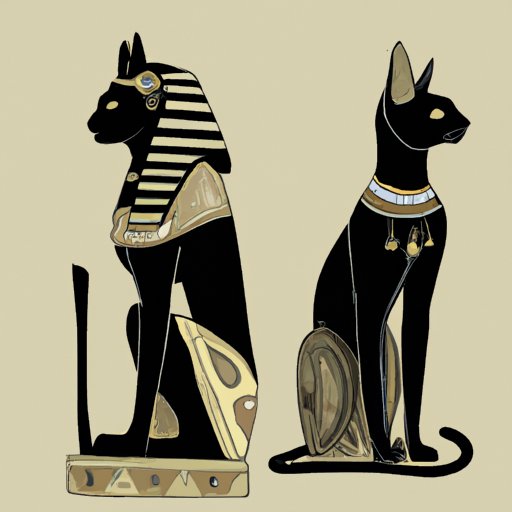Introduction
Cats are the most popular pets in the world, worshipped and adored by millions of people. But have you ever wondered why the ancient Egyptians regarded them as divine creatures and worshipped them? This article attempts to delve into the rich history, beliefs, myths, psychology, and cultural anthropology that made cats an object of devotion and reverence for the ancient Egyptians. Whether you’re a casual reader interested in ancient history or a curious cat lover, this article will take you on a journey to discover the secrets of the ancient Egyptians’ fascination with cats.
Historical Significance
Cats have a long and rich history in ancient Egypt. Artifacts and paintings have shown that cats have been domesticated for over 4000 years in Egypt. They were initially valued for their hunting abilities, but it was not long before they became an essential part of society. Cats became valued pets, and people began to see their unique qualities: they were agile, fiercely independent, and had keen senses, and they embodied qualities that were highly valued by the ancient Egyptians. As time passed, cats became so revered in the country that they were considered divine creatures. Some of the reasons why cats became worshipped in ancient Egypt were:
- Pest Control: Ancient Egyptians worshipped cats because they were efficient hunters of rodents. Rodents could destroy food sources, creating famine, and also spread diseases. Cats ensured that these pests were kept in check, and this became one way that cats were revered.
- Divine Qualities: The ancient Egyptians saw cats as having godlike qualities. They were nimble, had quick reflexes, and could walk on ledges without falling off. These qualities made them seem almost supernatural, and so they were seen as the representation of deities in their society.
- Protection: Cats were associated with goddesses who had powers of protection. The goddess Bastet, for example, was the protector of the home, and so having a cat around was believed to bring protection to one’s household.
Cultural Anthropology
The ancient Egyptians had a unique social structure that celebrated cats. The feline creatures were adored by almost all members of ancient Egyptian society. They were seen as positive beings that were full of symbolism and meaning. Statues of cats lined the streets and homes, and they were often depicted in art representing different tendencies such as good luck, blessings and protection. They were respected, liked and well taken care of. Politically the cats had an important function too. The Pharaoh, who was the ruler of the land, treated cats as a diplomatic tool. If a cat was given as a present or taken on a voyage to another country, it would symbolize a pact or alliance between the two countries
Mythology
Cats were one of the most important creatures in Egyptian mythology, often portrayed as having divine qualities. They were closely associated with the goddesses Bastet and Sekhmet. Bastet represented love, music, dance and was also the protector of the home and family. Sekhmet, on the other hand, was the goddess of destruction, pestilence and war. Her symbol was the lioness which was, in turn, a close relative of the house cat. In appearance, she was a fearsome creature that had significant power and strength behind her. She was seen as the protector of the Pharaoh and was sometimes depicted or imagined as a woman with a lioness face.
Psychology
The ancient Egyptian’s relationship with cats was not just based on their rational appreciation of their unique abilities. They were also influenced by psychological motives. Cats were symbols of independence, agility, and loyalty. The qualities that the ancient Egyptians saw in cats spoke to their deeper sense of self and helped to define their identity as a civilization. Cats embodied the excellence in many attributes that they admired such as gracefulness, independence, and alertness.
Comparative Culture
Comparing the ancient Egyptian reverence for cats with the ways that other cultures view animals can provide insights into the unique aspects of Egyptian culture. Many cultures around the world have recognized the qualities of cats and other animals such as strength, agility, and wisdom. The Greeks, for example, attributed wisdom to owls, elephants were revered in the Mahabharata, and lions were sacred creatures in many African cultures. However, the extent that Egyptians valorized cats was unique, which speaks to their particular cultural landscape and what they prized in their civilization. It is likely that this shared love for a creature helped to unify Egyptian society and contribute to its longevity.
Conclusion
Understanding the reasons why the ancient Egyptians worshipped cats is an essential step to unraveling the mysteries of this ancient civilization. Cats were more than just pets. They represented divine beings that had unique qualities that complemented their culture’s values, norms, and outlook on life. For instance, they were resilient, independent, and agile. They embodied elements of the Egyptian identity and helped to unite the people. At the same time, the Egyptian’s reverence for cats also influenced their daily lives, providing them protection, and an emotional outlet. In conclusion, worshipping cats was just one of the ways that the ancient Egyptians expressed their beliefs, values and, ultimately, their unique culture.
